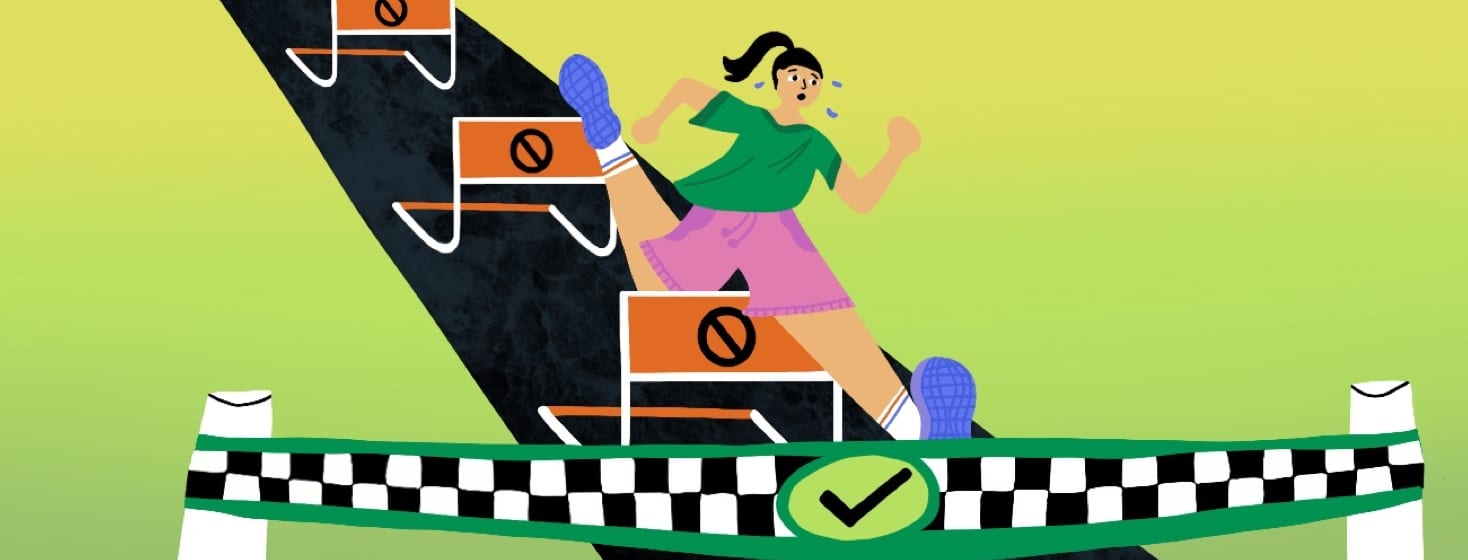Getting a Diagnosis: Hurdles in Identifying Postpartum Depression
From an outsider's perspective, it might seem easy enough to get a diagnosis of postpartum depression (PPD). Unfortunately, seeking out a diagnosis for any ailment, physical or mental, can often feel like we're running around in circles.
We take one symptom, and it might lead us in one direction, but another symptom might lead us in another. Yet, no matter which direction we turn, we find another hurdle or obstacle in the way. Often, it isn't until we’ve exhausted all possible options before a diagnosis is finally decided upon.
Getting a postpartum depression diagnosis
Get out of your own way
Two of the biggest hurdles for me when it came to getting my PPD diagnosis I had created within myself. I often find myself getting in my own way to finding answers to questions. When I find myself getting frustrated with some situation or problem, I must take a moment to mentally step aside and get out of my own dang way.
Once I'm able to do this, I often find the process of figuring things out gets moving much more quickly. If you're anything like me, you often get more frustrated with yourself rather than the situation you're trying to handle. Using this reminder to step out of your own way could help you find the right path to handling something.
Ignorance is NOT bliss
The first hurdle for me to finding the diagnosis of postpartum depression was my own lack of knowledge. I never even realized it was really a thing. All I knew about PPD was what I'd seen on TV or in the news about women who had done crazy or horrific things because of it.
I never thought that my problem could be PPD because I wasn't anywhere near struggling or breaking down like that. My own ignorance stood in the way to finding the help I needed during the early years after my oldest 2 children were born.
Don't downplay how you're feeling
Back in high school, I had been diagnosed with mild to moderate depression. Initially, the feelings and thoughts I had been experiencing weren’t any different than what I had struggled with previously.
So during the brief questionnaire that my post-natal care provider gave me each time at my first post-natal visit I answered as if nothing was wrong. But BOY HOWDY. Looking back now, I can see just how different and how severe the depression was after I had my children.
It's OK to not be OK
My first 2 children are 14 months apart from each other, so I wasn't even through my first experience with postpartum anything before I started the process over again. Add in the fact that I became a single parent before my second born was 1 and life was hellish for me.
But I thought all the things I was feeling and thinking were normal. I thought I was supposed to be feeling inadequate, empty, alone, and overwhelmed 24/7. It wasn't until my kids were probably 6 and 7 that I really began to understand that the emotions and thoughts that I had dealt with during those years were the exact opposite of normal.
You know you have a problem... Now what?
The second hurdle for me to getting a diagnosis was my inability to talk to people about it. It didn't matter if I was talking to my mom, sisters, friends, or doctors. I struggled to get the words to come out of my mouth.
I wanted to shrink into myself and disappear every time I thought about how things had gone after my previous births, because for me, things had gotten pretty bad at one point. I felt shame and guilt every time I remembered those times and I wanted to pretend that it hadn’t happened. Did I persevere? By God's grace and mercy, I did.
I needed to speak up
By the time I was pregnant with my third child (my eldest was 11) I had become an advocate for my second child's mental health, which had given me the experience and confidence to talk about my own mental health issues and future concerns while I was pregnant.
Before I was very far along, I had spoken candidly with my spouse, my primary care provider, and my OB/GYN about how things had gone for me after my first 2 babies. Pushing through the feelings of fear from judgement, I was able to communicate with everyone and we were able to determine that what I had been experiencing was PPD.
Making a care plan for postpartum depression
With that knowledge, it was very likely that I would struggle with it again after this birth as well. Knowing about my previous struggles we were able to create a care plan to prepare for the oncoming storm that is PPD.
Getting a diagnosis was a first step toward healing
Getting the diagnosis didn’t solve my problems, but getting the diagnosis helped us to find different ways to circumvent the ways my brain would try to attack itself. Postpartum depression was, and is (I have 18-month-old twins), still something that I struggle with daily.
Does knowing what the problem is make everything all sunshine and rainbows? No,it doesn’t. But it helps me to realize that on the days when I'm struggling the hardest that it isn’t because I'm a terrible person, but rather, I am struggling because of the PPD.
Continuing to educate myself and allowing myself to speak candidly to anyone who will listen has helped me tremendously through this season of my life in a way I could never imagine after my first two pregnancies.
